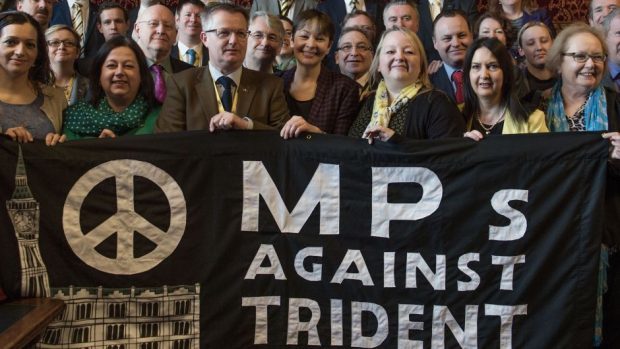Opponents of Trident renewal will take their protest to Westminster today in a mass lobby of MPs ahead of a crunch vote.
Pleas signed by critics from every constituency of the north and north-east will be handed over in a bid to sway the controversial debate.
The Commons will decide on Monday whether to replace the submarines which carry the UK’s nuclear weapons system.
The Bishop of Aberdeen, Hugh Gilbert, is one of eight Catholic leaders in Scotland who has denounced the replacement of the deterrent.
They warned that “lives are being lost now because money that could be spent on the needy and the poor is tied up in nuclear arsenals”.
Critics say the overall cost to the UK could exceed £200billion.
Rallies are planned in Aberdeen, Ullapool and Wick on Saturday as part of a national campaign to sway MPs.
The SNP and Scottish Labour are bitterly opposed to the move – but under-fire UK Labour leader Jeremy Corbyn faces a large-scale backbench revolt that would deliver a firm majority for renewal.
Among those whose views are being represented today is Jonathan Russell, chairman of Aberdeen and District CND.
He called for the vote to be postponed until the political turmoil unleashed by the Brexit vote had subsided.
He said: “It is totally the wrong time. It has to be given much more serious consideration than a quick vote in the House of Commons.
“Nuclear weapons don’t keep us safe, divert resources from essential spending and are based in Scotland.”
Bishop Gilbert and his Catholic colleagues – including Brian McGee, Bishop of Argyll and the Isles – said renewal “is questioned not just by those concerned with the morality of nuclear weapons themselves but also by those concerned about the use of scarce financial resources.”
Scottish Conservative MSP for Aberdeenshire West Alexander Burnett said scrapping Trident would leave the UK “defenceless” against growing threats and result in big job losses at the fleet’s Faslane base.
“We remain committed to nuclear disarmament when it is done on an international basis and in a credible way. But as long as nuclear weapons exist, we must retain a continuous at-sea deterrent,” he said.
